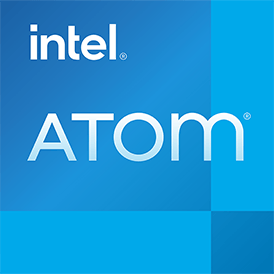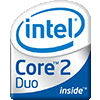
Intel Atom x7-Z8750 Benchmark, Test and specs
Last updated:
The Intel Atom x7-Z8750 is a 4 core processor. It can handle 4 threads simultaneously and was introduced in Q1/2016. The Intel Atom x7-Z8750 is based on the 5. generation of the Intel Atom series and requires a mainboard with the socket BGA 138. The Intel Atom x7-Z8750 scores 239 points with one CPU core in the Geekbench 5 benchmark. When using all CPU cores, the result is 855 points.

| Name: | Intel Atom x7-Z8750 |
|---|---|
| Family: | Intel Atom (108) |
| CPU group: | Intel Atom x3/x5/x7 (9) |
| Architecture: | Cherry Trail |
| Segment: | Mobile |
| Generation: | 5 |
| Predecessor: | -- |
| Successor: | -- |
CPU Cores and Base Frequency
The 4 CPU cores of the Intel Atom x7-Z8750 clock with 1.60 GHz (2.56 GHz). The number of CPU cores and the clock frequency of the processor are largely responsible for the overall performance.
| CPU Cores / Threads: | 4 / 4 |
|---|---|
| Core architecture: | normal |
| Cores: | 4x |
| Hyperthreading / SMT: | No |
|---|---|
| Overclocking: | No |
| Frequency: | 1.60 GHz |
| Turbo Frequency (1 Core): | 2.56 GHz |
| Turbo Frequency (4 Cores): | 2.56 GHz |
Internal Graphics
With the Intel HD Graphics 405 (16EU), the Intel Atom x7-Z8750 has an build in graphic solution. It has 16 SM processors, which have a total of 128 texture shaders. The iGPU not only enables games, but also significantly accelerates video playback.
| GPU name: | Intel HD Graphics 405 (16EU) |
|---|---|
| GPU frequency: | 0.20 GHz |
| GPU (Turbo): | 0.60 GHz |
| Compute units: | 16 |
| Shader: | 128 |
| Hardware Raytracing: | No |
| Release date: | Q2/2015 |
| Max. displays: | 3 |
|---|---|
| Generation: | 8 |
| Direct X: | 12 |
| Technology: | 14 nm |
| Max. GPU Memory: | 8 GB |
| Frame Generation: | No |
Hardware codec support
Processors that have an integrated graphics can play videos faster and more efficiently. This can have a positive effect on the battery life of notebooks, for example.
| h265 / HEVC (8 bit): | No |
|---|---|
| h265 / HEVC (10 bit): | No |
| h264: | Decode / Encode |
| VP8: | Decode |
| VP9: | No |
| AV1: | No |
|---|---|
| AVC: | Decode / Encode |
| VC-1: | Decode |
| JPEG: | Decode |
Memory & PCIeThe Intel Atom x7-Z8750 supports up to 8 GB memory in up to 2 (Dual Channel) memory channels. This results in a maximum memory bandwidth of 25.6 GB/s. |
|
| Memory type: | Memory bandwidth: |
|---|---|
| LPDDR3-1600 | 25.6 GB/s |
| Max. Memory: | 8 GB |
| Memory channels: | 2 (Dual Channel) |
| ECC: | No |
| PCIe: | 2.0 x 2 |
| PCIe Bandwidth: | 1.0 GB/s |
Thermal ManagementWith the TDP, the processor manufacturer specifies the cooling solution required for the processor. The Intel Atom x7-Z8750 has a TDP of 2 W. |
|
|---|---|
| TDP (PL1 / PBP): | 2 W |
| TDP (PL2): | -- |
| TDP up: | -- |
| TDP down: | -- |
| Tjunction max.: | -- |
Technical details
The Intel Atom x7-Z8750 has a 2.00 MB large cache. The processor is manufactured in 14 nm. Modern production increases the efficiency of the processor.
| Technology: | 14 nm |
|---|---|
| Chip design: | Monolithic |
| Socket: | BGA 138 |
| L2-Cache: | -- |
| L3-Cache: | 2.00 MB |
| AES-NI: | Yes |
| Operating systems: |
| Virtualization: | VT-x, VT-x EPT |
|---|---|
| Instruction set (ISA): | x86-64 (64 bit) |
| ISA extensions: | SSE4.1, SSE4.2 |
| Release date: | Q1/2016 |
| Release price: | 30 $ |
| Part Number: | -- |
| Documents: | Technical data sheet |
Rate this processor
Benchmark results

The benchmark results for the Intel Atom x7-Z8750 have been carefully checked by us. We only publish benchmark results that have been created by us or that have been submitted by a visitor and then checked by a team member. All results are based on and fullfill our benchmark guidelines.
Geekbench 5, 64bit (Single-Core)
Geekbench 5 is a cross plattform benchmark that heavily uses the systems memory. A fast memory will push the result a lot. The single-core test only uses one CPU core, the amount of cores or hyperthreading ability doesn't count.

|
AMD A8-3500M
4C 4T @ 2.40 GHz |
||

|
AMD A6-6310
4C 4T @ 2.40 GHz |
||

|
Intel Pentium J2900
4C 4T @ 2.67 GHz |
||
|
|
Intel Atom x7-Z8750
4C 4T @ 2.56 GHz |
||

|
Intel Atom x7-Z8700
4C 4T @ 2.40 GHz |
||

|
Intel Celeron J1750
2C 2T @ 2.41 GHz |
||

|
Intel Celeron J1800
2C 2T @ 2.58 GHz |
||
Geekbench 5, 64bit (Multi-Core)
Geekbench 5 is a cross plattform benchmark that heavily uses the systems memory. A fast memory will push the result a lot. The multi-core test involves all CPU cores and taks a big advantage of hyperthreading.

|
Intel Celeron N4020C
2C 2T @ 2.80 GHz |
||

|
Intel Core i3-3217U
2C 4T @ 1.80 GHz |
||

|
MediaTek Helio P23
8C 8T @ 2.50 GHz |
||
|
|
Intel Atom x7-Z8750
4C 4T @ 2.56 GHz |
||

|
Intel Celeron G1610T
2C 2T @ 2.30 GHz |
||

|
Intel Pentium N3540
4C 4T @ 2.66 GHz |
||

|
Intel Celeron G530
2C 2T @ 2.40 GHz |
||
Geekbench 6 (Single-Core)
Geekbench 6 is a benchmark for modern computers, notebooks and smartphones. What is new is an optimized utilization of newer CPU architectures, e.g. based on the big.LITTLE concept and combining CPU cores of different sizes. The single-core benchmark only evaluates the performance of the fastest CPU core, the number of CPU cores in a processor is irrelevant here.

|
Intel Pentium J2900
4C 4T @ 2.67 GHz |
||

|
Intel Pentium N3530
4C 4T @ 2.58 GHz |
||

|
Intel Pentium N3710
4C 4T @ 2.56 GHz |
||
|
|
Intel Atom x7-Z8750
4C 4T @ 2.56 GHz |
||

|
Intel Celeron N2840
2C 2T @ 2.58 GHz |
||

|
Intel Atom C2750
8C 8T @ 2.60 GHz |
||

|
AMD GX-217GA
2C 2T @ 1.65 GHz |
||
Geekbench 6 (Multi-Core)
Geekbench 6 is a benchmark for modern computers, notebooks and smartphones. What is new is an optimized utilization of newer CPU architectures, e.g. based on the big.LITTLE concept and combining CPU cores of different sizes. The multi-core benchmark evaluates the performance of all of the processor's CPU cores. Virtual thread improvements such as AMD SMT or Intel's Hyper-Threading have a positive impact on the benchmark result.

|
MediaTek MT8173
4C 4T @ 1.80 GHz |
||

|
Intel Pentium N3530
4C 4T @ 2.58 GHz |
||

|
Intel Celeron 1005M
2C 2T @ 1.90 GHz |
||
|
|
Intel Atom x7-Z8750
4C 4T @ 2.56 GHz |
||

|
Intel Core i3-3217UE
2C 4T @ 1.60 GHz |
||

|
Intel Celeron 3215U
2C 2T @ 1.70 GHz |
||

|
Apple A8
2C 2T @ 1.50 GHz |
||
iGPU - FP32 Performance (Single-precision GFLOPS)
The theoretical computing performance of the internal graphics unit of the processor with simple accuracy (32 bit) in GFLOPS. GFLOPS indicates how many billion floating point operations the iGPU can perform per second.

|
Intel Celeron 3205U
Intel HD Graphics (Broadwell GT1) @ 0.80 GHz |
||

|
Intel Celeron 3755U
Intel HD Graphics (Broadwell GT1) @ 0.80 GHz |
||

|
Intel Pentium 3805U
Intel HD Graphics (Broadwell GT1) @ 0.80 GHz |
||
|
|
Intel Atom x7-Z8750
Intel HD Graphics 405 (16EU) @ 0.60 GHz |
||

|
Intel Celeron J3060
Intel HD Graphics 400 @ 0.70 GHz |
||

|
Intel Celeron J3160
Intel HD Graphics 400 @ 0.70 GHz |
||

|
Intel Celeron J4125
Intel UHD Graphics 600 @ 0.75 GHz |
||
Estimated results for PassMark CPU Mark
Some of the CPUs listed below have been benchmarked by CPU-monkey. However the majority of CPUs have not been tested and the results have been estimated by a CPU-monkey’s secret proprietary formula. As such they do not accurately reflect the actual Passmark CPU mark values and are not endorsed by PassMark Software Pty Ltd.

|
Intel Atom x7-Z8700
4C 4T @ 2.40 GHz |
||

|
Intel Pentium 3825U
2C 4T @ 1.90 GHz |
||

|
Intel Celeron 4205U
2C 2T @ 1.80 GHz |
||
|
|
Intel Atom x7-Z8750
4C 4T @ 2.56 GHz |
||

|
AMD Athlon II X3 405e
3C 3T @ 2.30 GHz |
||

|
Intel Core2 Duo E8600
2C 2T @ 3.33 GHz |
||

|
AMD Athlon II X3 400e
3C 3T @ 2.20 GHz |
||
Cinebench R15 (Single-Core)
Cinebench R15 is the successor of Cinebench 11.5 and is also based on the Cinema 4 Suite. Cinema 4 is a worldwide used software to create 3D forms. The single-core test only uses one CPU core, the amount of cores or hyperthreading ability doesn't count.

|
AMD A10-7300
4C 4T @ 3.20 GHz |
||

|
AMD Athlon 5350
4C 4T @ 2.05 GHz |
||

|
Intel Pentium J2900
4C 4T @ 2.67 GHz |
||
|
|
Intel Atom x7-Z8750
4C 4T @ 2.56 GHz |
||

|
Intel Pentium N3710
4C 4T @ 2.56 GHz |
||

|
Intel Pentium J3710
4C 4T @ 2.64 GHz |
||

|
Intel Celeron J3060
2C 2T @ 2.48 GHz |
||
Cinebench R15 (Multi-Core)
Cinebench R15 is the successor of Cinebench 11.5 and is also based on the Cinema 4 Suite. Cinema 4 is a worldwide used software to create 3D forms. The multi-core test involves all CPU cores and taks a big advantage of hyperthreading.

|
AMD A8-4500M
4C 4T @ 2.80 GHz |
||

|
AMD Phenom II X2 550
2C 2T @ 3.10 GHz |
||

|
AMD A10-4655M
4C 4T @ 2.80 GHz |
||
|
|
Intel Atom x7-Z8750
4C 4T @ 2.56 GHz |
||

|
Intel Pentium N3710
4C 4T @ 2.56 GHz |
||

|
Intel Pentium N3540
4C 4T @ 2.66 GHz |
||

|
Intel Celeron G1610T
2C 2T @ 2.30 GHz |
||
Benchmarks

Geekbench 5 (SC)
2,488 entries
2,488 entries

Geekbench 5 (MC)
2,461 entries
2,461 entries

Geekbench 6 (SC)
1,755 entries
1,755 entries

Geekbench 6 (MC)
1,703 entries
1,703 entries

FP32 SP (iGPU)
2,042 entries
2,042 entries

PassMark CPU-Mark
2,392 entries
2,392 entries

Cinebench R15 (SC)
1,106 entries
1,106 entries

Cinebench R15 (MC)
1,101 entries
1,101 entries

Cinebench R11.5 (SC)
825 entries
825 entries

Cinebench R11.5 (MC)
836 entries
836 entries

Cinebench R11.5 iGPU
383 entries
383 entries
Popular comparisons
back to index





